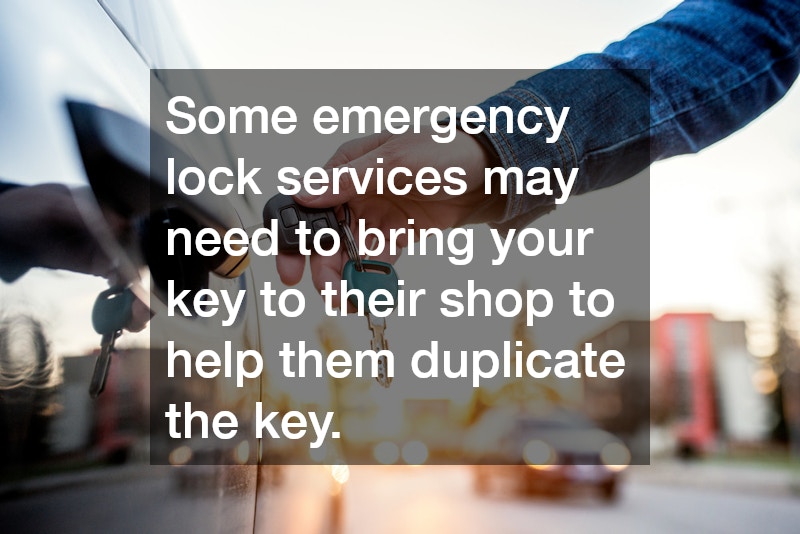
When you’re driving, you could have an emergency. One of the types of emergencies car owners may face is being locked out of their cars. If you have a membership in an emergency roadside service, you can call them. However, many auto owners don’t belong to that sort of service and need to call a 24-hour locksmith for cars.

If you can’t get help from anyone else, you can call a mobile emergency locksmith. According to Pros on Call, they are prepared with locksmith tools to get into your car. Many auto owners with non-traditional keys may wonder if they can get an emergency car key replacement. Although locksmiths may not give you a new key on the spot, they can often open your car or your trunk.

Some emergency lock services may need to bring your key to their shop to help them duplicate the key. A 24-hour car key replacement can sometimes be provided, but it’s always best to have a duplicate key that you leave with a trusted friend. According to Carfax, if you’re wondering where a replacement key is less expensive, a locksmith will typically cost less than a car dealership.

Becoming a new driver is exciting, whether you’re a teen or an adult. In fact, only 87% of adults have their license to drive. The freedom of being able to drive gives you access to the world in new ways. But it’s not all fun and games. Driving can be dangerous if you aren’t prepared or careful. Even if you do all you can, those around you may not be as prepared. There are things you must consider, such as purchasing a car, taking care of it, getting insurance, being safe while you drive, and being prepared for emergencies. This guide will give you basic auto safety tips to prepare you to hit the road.
Purchasing A Car
Purchasing a car is a big commitment to make. Whether you’re buying new or used, you should do a lot of research ahead of time to know what styles and brands are the best options. That’s why one of the number one auto safety tips is to get a trustworthy car that will keep you safe.
New vs. Used
One of the first decisions you’ll make when becoming a new driver is whether to buy a new or used car. There are quite a few things to consider with this decision and one option may be right for some people and wrong for others. It’s best presented in a list of pros and cons.
- Pros of buying new: The biggest advantage of buying a new car from auto dealers is that you are generally purchasing a car with a warranty. Because it’s never been driven by anyone else, it shouldn’t have any issues. You won’t have to worry about surprise problems and if you do in fact end up with a lemon, the warranty should cover any maintenance or even mean you can replace the car. You may also be able to work with your car dealer to get a lower interest rate and pay less interest over the life of your car loan.
- Cons of buying new: Buying a new car is expensive, and the minute you drive the car off the lot, its value depreciates greatly. If you have the money saved up to buy a new car outright or put down a large down payment, it could be an option for you. You may even consider putting up your repairable salvage motorcycle for sale to help with a downpayment if you’re not willing to spruce it up yourself. However, if you are not financially prepared for such a big purchase, buying a new car may not be the best option for you.
- Pros of buying used: The biggest advantage of buying a used car is you will pay significantly less for the car than you would if you were purchasing a new car. You can find great auto loan rates through your local bank or credit union, and because you’re spending less it’s easier to pay it off sooner and worry less about paying an arm and a leg for interest over the time you have the loan.
- Cons of buying used: When you buy a new car, you aren’t guaranteed that it’s in perfect running condition. Even if the seller has done all they can to take care of the car a perform regular maintenance, problems may arise and you won’t have a warranty to cover them. As previously mentioned, one of the most important auto safety tips is to do research on certain makes and models before you purchase a car. As you do this, you’ll learn that there are some cars that last longer in general. If you’re planning to buy a used car, you may consider looking for one of those options.
Car Maintenance

Once you’ve purchased your car, you need to make sure you take care of it. That’s why second on the list of auto safety tips for new drivers is to perform regular maintenance and auto repairs on your car.
Maintenance doesn’t just mean waiting until the check engine light is on, or the sticker in the corner of your window tells you according to your mileage, it’s time to get your oil changed, though those are both important. Proper maintenance means staying on top of any care or repairs your car may need, and not waiting until the last minute to get them done.
Here are some of the most important maintenance tasks you should stay on top of to keep your car in good working conditions.
Oil
As previously mentioned, getting your oil changed can be as simple as visiting one of the automotive service centers in your area when the sticker in the corner of your window says that according to your car mileage, it’s time to get a change. Oil is the thing that keeps your engine running and keeps other parts from grinding against each other. If you don’t get your oil changed regularly, it can severely damage your engine due to built-up debris that can cause friction and grinding.
While you can leave the actual oil change up to the professionals, you should learn how to check your oil levels at the least. There are plenty of videos on the internet to teach you how to access your oil tank and what you should look for when checking it. One of the top auto safety tips is to know how to take care of your car, and learning basic tasks, such as checking your oil, is definitely on that list.
Tires

Your tires are the things that keep your car rolling forward and separated from the road. If you’ve got issues with your tires, it’s likely your car won’t be going anywhere soon. Make a habit of checking your tires often, at least monthly, to check for air level issues, leaks, baldness, or objects that could threaten the integrity of your tires.
You should also learn how to fill your tires. But before you go adding any air, make sure you know the correct air pressure for your tires. You should be able to find it on a sticker in your door jam or in your car’s user manual. Incorrect tire pressure can severely damage your tires, so make sure you know that before you make any changes.
Fluids
While motor oil is the most common fluid to be constantly checked and changed, it isn’t the only important fluid that needs attention in your car. You need to regularly check your transmission fluids, brake fluids, coolant, and washer fluid. As a new driver, you will want to trust professionals at auto mechanic shops to check your fluid levels and make sure your car is good to go.

However, once you have spent some time with your car, just like learning to check your oil, you can find videos online to learn how to check the levels for all other fluids. Transmission fluid has a dipstick similar to your oil, but with all the other oils you’ll need to remove a cap and visually inspect the tanks of each.
Belts And Hoses
Learning to inspect your belts and hoses and know what you’re looking for takes more skill than a beginner may have. But as previously mentioned, one of the most important auto safety tips is to know how to take care of your car. As such, it may be worth it to take the time to understand everything going on under the hood of your car, including belts and hoses.
If you have any additions to your car, such as truck lift installs that have been performed, you will need to check on the required maintenance for those as well to keep your car in the best condition possible.
Safe Driving
When it comes to auto safety tips, being a safe driver, in general, is always number one. There is a lot to being a safe driver. As you take your driving course before you get your driver’s license, pay attention to the rules you are taught. They are more than just guidelines for how to stay out of trouble while driving, they will ultimately help keep you safe while on the road. Here are some of the top auto safety tips to remember while driving:
- Stay Focused And Alert: The number one driving safety tip to remember is to always stay focused and alert while driving. Put your phone in a place where you can’t hear it or be distracted by it while you’re driving. Many lives are taken each year by people who are distracted by their phones while driving. You should also make sure you are well-rested and not under the influence of any substances or medicine that could make you drowsy. Staying alert while driving will not only make sure you are driving safe, but it will also allow you to be aware of any dangers around your vehicle, such as another driver being unsafe or an animal coming into the roadway. If you come across issues with a roadway, such as potholes, you may also consider contacting the city to send an asphalt paving company out to fix the issue and help keep drivers safe.
- Don’t Depend On Others: You can’t rely on other drivers to always be safe around you. Even if you are doing your best to drive safely, others may not. That’s why one of the more important auto safety tips is to never depend on other drivers. It’s best to always anticipate the worst-case scenario. If you’re trying to merge, don’t assume people are going to move out of your way. If you’ve stopped at a stop sign, don’t assume someone coming the other direction will. Be on the watch for how others drive to keep yourself safe if they aren’t being safe themselves.
- Follow Safety Signs: Always follow the posted auto signs in the area you’re in. Whether it’s the speed limit, stop or yield signs, or caution signs for icy roads, they are all there to help keep you safe. The speed limit sign is one that many choose to ignore quite often. By doing that you may think you’re getting somewhere faster, but in reality, you’re simply putting yourself, those in your car, and those around you at greater risk of danger.
Emergency Preparedness
While no one plans to be involved in an emergency situation, it’s better to be prepared than to find yourself in one and not know what to do. Being prepared for emergencies is one of the most important auto safety tips for new drivers. For example, the last thing you want to be worrying about after you’ve been involved in a car accident is finding a car accident lawyer. You may consider doing some research ahead of time to have a few options in the situation that you end up needing legal help.

Certain auto insurance companies have benefits like emergency towing or discounted rentals in the case you need a replacement car. Be aware of these benefits so, in the scenario that you need help, you will already know the options you have at your disposal.
It’s also a good idea to have an emergency kit packed in your car. If you ever find yourself stranded somewhere, an emergency kit can help you to stay safe while you wait for help. Your car emergency kit should contain items like a first aid kit, a map, a charger for your cell phone, water and food, a flashlight, tools, and warm clothing or a blanket in case you’re stuck in cold weather.
Time To Hit The Road
Now that you’ve learned the top auto safety tips for new drivers, it’s time to test them out. Driving is a big step, for both teens and adults. It will make life much easier, but it will also come with its challenges. As long as you follow these tips, you will be well on your way to being a safe and prepared driver.



